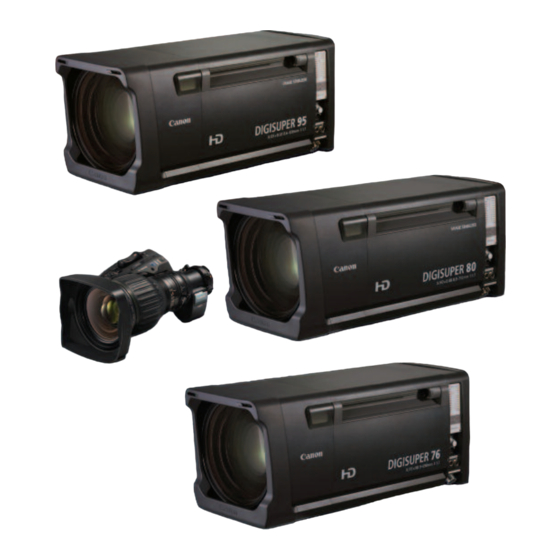Canon DIGISUPER 27AF 포켓 매뉴얼 - 페이지 6
{카테고리_이름} Canon DIGISUPER 27AF에 대한 포켓 매뉴얼을 온라인으로 검색하거나 PDF를 다운로드하세요. Canon DIGISUPER 27AF 22 페이지. Canon camera lens user manual
Canon DIGISUPER 27AF에 대해서도 마찬가지입니다: 포켓 매뉴얼 (22 페이지)

HJ14EX4.3B IRSE/IASE
Wide Angle HD Lens
After nearly a decade of advances in its world-renowned
optical R&D - and ongoing dialogue with hands-on users
worldwide - Canon has introduced the evolutionary next-step in high
definition imaging: the HJ14ex4.3B IRSE/IASE wide-angle portable
HDTV lens. Totally new and unique in its design, the HJ14 is the
product of Canon's very latest optical design tools, newly developed
glass elements, and highly advanced optical coatings. In addition,
the HJ14's newly developed Digital Drive unit provides improved
operability and ergonomic advances for user comfort and convenient
control of lens functions.
Wide, Advanced Optical Performance
Canon's HJ14 wide-angle portable HDTV lens features a minimum
focal length of 4.3mm and an angular field of view of 96.3° at the
wide end of the 16:9 HDTV aspect ratio. This optical performance is
combined with a 14x zoom range reaching to 60mm (120mm with
extender), which greatly expands creative options for the
acquisition of crystal-clear, and virtually distortion-free HDTV
video images.
Improved Operability, Digital Drive, and Lighter Weight
Employing free-form curves based on the shape of human hands,
Canon mechanically redesigned its new Digital Drive unit to be
more ergonomically friendly, making it narrower and shorter, and
opening more space for manual focusing. It also features newly
developed coatings and a new rubber grip support for a better
tactile interface. The overall result is the enhancement of user
interface and the reduction of stress and fatigue, especially
during prolonged shooting. The HJ14ex4.3B also employs a
smaller hood, which helps the camera operator view more of the
actual scene.
10
HJ15EX8.5B KRSE-V
Image Stabilized EFP HDTV Lens
Canon's HJ15ex8.5B
is the world's first
HDTV portable 2/3-
inch zoom lens with
a built-in Optical
Image Stabilizer.
Designed to maintain
stable images even when
the lens-camera is subject to jolts
and vibrations, the HJ15ex8.5B KRSE-V uses Canon's patented
Vari-Angle Prism image-stabilizer (VAP-IS) technology. Its high degree
of compensation is sustained all the way from telephoto to wide-angle
settings. This is of particular importance considering the extreme
image detail associated with HD acquisition. This unique technology
greatly extends flexibilities in EFP shooting on location - all within a
compact high-performance lens to weigh in at only 4.4 lbs.
Canon's Vari-Angle Prism technology entails a novel optical group
made up of two flat glass elements and a sealed bellows containing
a high refractive index liquid, selectively placed within the lens overall
optical system. Physical perturbations to the lens, in the form of jolts
or vibrations, flex the bellows proportional to the amplitude of these
disturbances. The associated distortion of the liquid instantaneously
alters the direction of the transmitted light rays in a manner designed
to counter the incoming light ray displacements created by these
disturbances. The system has been optimized to introduce a high-
degree of real-time compensation for image instabilities arising from
all forms of lens-camera operational unsteadiness.
The HJ15ex8.5 B KRSE-V is ideally suited for diverse challenging
outdoor shooting situations because it can stabilize a broad range
of vibration frequencies. Examples range from the low-frequency
vibrations encountered on a camera operator's shoulder in a crowd
situation, to tripod-mounted operation on shaky platforms, to the
higher-frequency vibration that cameras are subject to when
operated on vehicles, motorbikes, boats, or helicopters. Four
selectable stabilization modes are available to facilitate optimization
of the degree of correction under diverse, and sometimes unique,
shooting conditions.
The effectiveness of the image stabilization system was highlighted
in the coverage by a major European production company of the
Tour de France, whose camera operator was shooting hand-held from
a motorbike pillion, and consistently delivered rock-steady close-ups
of the cyclists even on very uneven roads.
11
